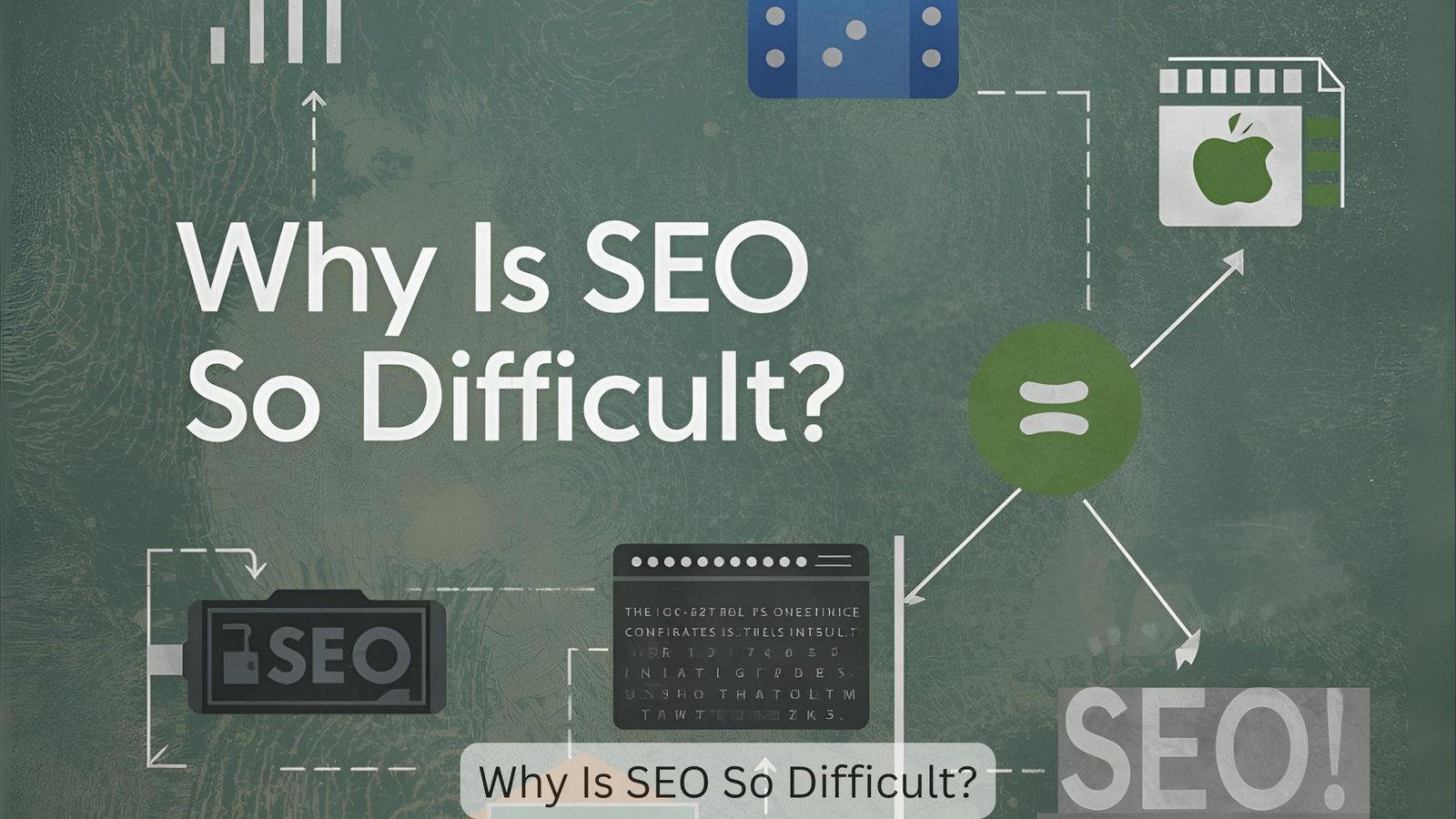Why Is SEO So Difficult?
 You might wonder why SEO feels like a never-ending battle. With search engines constantly tweaking their algorithms, keeping up can feel overwhelming. Add in the fierce competition and the need for high-quality content, and it’s clear why many struggle. Technical SEO issues further complicate things. So, what are the key factors making SEO so challenging? Let’s break down the most critical elements that can either make or break your online visibility.
You might wonder why SEO feels like a never-ending battle. With search engines constantly tweaking their algorithms, keeping up can feel overwhelming. Add in the fierce competition and the need for high-quality content, and it’s clear why many struggle. Technical SEO issues further complicate things. So, what are the key factors making SEO so challenging? Let’s break down the most critical elements that can either make or break your online visibility.
The Ever-Changing Algorithms
As search engines evolve, it’s crucial to stay on top of the ever-changing algorithms that dictate your website's visibility.
These algorithms determine how your content ranks, influencing not just traffic but your overall online success. When you think you’ve mastered one update, another rolls out, often shifting ranking factors dramatically.
You need to adapt quickly, understanding how changes impact your keywords, site speed, mobile-friendliness, and user engagement. Regularly reviewing your SEO strategies helps ensure you're not left behind.
Utilize analytics to gauge what's working and what's not. By continuously educating yourself and modifying your tactics, you can maintain your site's relevance and authority in search results. For deeper insights and advanced strategies, you may benefit from consulting a dedicated SEO specialist in India.
Intense Competition in the Digital Space
While navigating the digital landscape, you’ll quickly realize that intense competition can make it challenging to stand out. Every industry has numerous players vying for attention, and you’re not just competing with local businesses; you’re up against global brands too.
This saturation means that even a well-optimized site might struggle to gain traction. You need to be strategic about your SEO efforts, focusing on niche keywords and unique value propositions.
Additionally, keeping an eye on your competitors is crucial; understanding their tactics can help you adapt and innovate. Remember, it's not just about being online—it's about being relevant and engaging.
To thrive, you'll need to continuously refine your approach and stay ahead of industry trends.
The Importance of Quality Content
Creating high-quality content is essential for your SEO success, especially in a crowded digital landscape. When you focus on providing valuable, relevant information, you engage your audience and encourage them to share your content. This not only boosts your credibility but also increases your chances of earning backlinks, which are crucial for improving your search rankings.
Moreover, search engines prioritize content that addresses user intent, so it’s vital to understand what your audience is looking for. By crafting well-researched, informative articles, you help solve their problems and answer their questions.
Consistently delivering quality content not only enhances user experience but also builds trust, making visitors more likely to return to your site. Ultimately, quality content is the cornerstone of effective SEO.
Technical SEO Challenges
Quality content lays the groundwork for your online presence, but without addressing technical SEO challenges, even the best articles can struggle to rank.
You might face issues like slow loading speeds, mobile friendliness, or improper URL structures that can hinder your site's performance. If your website isn’t indexed properly, search engines can’t find your content, leaving your hard work unnoticed.
You also need to ensure your site is secure with HTTPS; otherwise, you risk losing visitors. Additionally, managing duplicate content and broken links is crucial to maintain authority and user trust.
The Role of User Experience
User experience (UX) plays a crucial role in how visitors interact with your website, influencing both engagement and rankings. When users find your site intuitive and enjoyable, they’re more likely to stay longer, explore more pages, and return in the future.
A smooth navigation, fast loading times, and mobile responsiveness are essential elements that enhance UX. If your site frustrates users with slow speeds or confusing layouts, they’ll leave quickly, negatively impacting your bounce rate and search rankings.
Incorporating clear calls to action and easy-to-read content also helps keep visitors engaged. Ultimately, prioritizing UX not only boosts satisfaction but also signals to search engines that your site is valuable, which can lead to improved visibility in search results.
Local SEO Considerations
When targeting local customers, it’s essential to optimize your SEO strategy for local search results.
Start by claiming and verifying your Google My Business listing. This helps your business appear in local pack results, making it easier for customers to find you.
Use local keywords throughout your website and content, including city names and neighborhoods to enhance relevance.
Encourage customer reviews, as they not only boost your credibility but also improve your local rankings.
Additionally, ensure your business's name, address, and phone number (NAP) are consistent across all online platforms.
Finally, consider local backlinks from community sites and partnerships, as these can significantly improve your authority in local searches.
Mobile Optimization Requirements
As mobile devices continue to dominate internet usage, optimizing your website for mobile is crucial for maintaining visibility and providing a seamless experience.
First, ensure your site has a responsive design that adapts to different screen sizes. This way, users can easily navigate your content without zooming or scrolling excessively.
Second, prioritize fast loading speeds; mobile users expect quick access. Compress images and minimize code to achieve this.
Third, make sure your buttons and links are easily clickable, avoiding frustration.
Lastly, consider the user experience; simple navigation and readable fonts enhance engagement.
Measuring Success and Analytics
How do you really know if your SEO efforts are paying off? You need to measure success through analytics.
Start by tracking key performance indicators (KPIs) like organic traffic, bounce rate, and conversion rates. Use tools like Google Analytics to gain insights into user behavior and website performance. If you’re motivated to take control of your growth, you might wonder whether SEO can be learned independently.
Monitor your keyword rankings to see if they improve over time. Set specific goals, whether it’s increasing page views or boosting sales, and analyze your progress regularly.
Don’t forget about engagement metrics; high time on site and low bounce rates generally indicate effective SEO.
By evaluating this data, you can identify what’s working and what isn’t, ultimately refining your strategy to achieve better results.
Keeping up With Industry Trends
Staying updated with industry trends is vital for effective SEO strategy. The digital landscape changes rapidly, with search engine algorithms constantly evolving.
To stay ahead, you need to follow industry news, read relevant blogs, and participate in forums. This helps you understand what works and what doesn’t, allowing you to adapt your tactics accordingly.
Social media platforms often highlight new trends, so engage with these channels to gather insights. Additionally, attending webinars and conferences can provide valuable knowledge and networking opportunities.
By keeping your finger on the pulse, you can refine your SEO approach, ensuring your content remains relevant and competitive.
Conclusion
In conclusion, navigating the complexities of SEO isn’t easy. You’ve got to stay on top of ever-changing algorithms, fierce competition, and the need for high-quality content. Don’t forget about technical challenges and user experience, along with local and mobile optimization. By continuously measuring your success and keeping up with industry trends, you can adapt your strategies and improve your visibility. Embrace the challenge, and you’ll find your way to success in the digital landscape.
